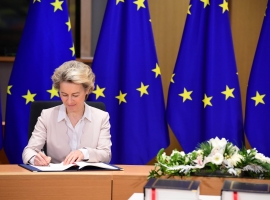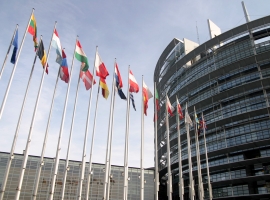
France will use a G7 finance ministers' meeting it is hosting next week for a new push on minimum corporate taxation, although it is too early to agree on a specific rate, a finance ministry source said on Friday.
France has put fiscal justice at the heart of its year-long presidency of the Group of Seven industrialised nations. The July 17-18 summit takes place in Chantilly, north of Paris.
France and Germany made a proposal this year for minimum corporate taxation as part of a major overhaul of decades-old cross-border tax rules under way in the Organisation for Economic Cooperation and Development (OECD). Their efforts have been boosted by the Trump administration's 2017 tax reform which in effect introduced a minimum level of tax in the United States.
France hopes that solid backing from G7 countries for minimum taxes will boost the efforts of the OECD, which is seeking agreement among nearly 130 countries by the end of 2020.
"One of the first priorities of this G7 finance ministers meeting is to revamp taxation for the 21st century such that it is adapted to the economic realities of the 21 century," the finance ministry source said.
Finance Minister Bruno Le Maire argues current rules allow big internet countries to get away without paying their fair share of tax as they can book profits in low-tax jurisdictions like Ireland regardless wherever the income originates from.
The source added that two G7 countries were not politically in a position to be able to agree either on a specific rate or a range.
"The best we can hope for is to agree on the principle of a range of rates," the source said.
A second finance ministry source said that the two G7 countries with reservations were Canada and Britain, where calls in the latter are growing for the government to use its exit from the European Union to cut taxes.
In the absence so far of international progress updating tax rules, France passed a tax on Thursday on big internet firms' French income, defying a U.S. threat to respond with a probe that could trigger retaliatory tariffs.
In addition to the focus on tax, the G7 meeting in France will also weigh on the emergence on new digital currencies after Facebook's Libra project thrust the matter to the fore.
Regulators, central bankers and governments have joined in a chorus since Facebook's announcement, insisting that the company must respect anti-money-laundering rules and ensure the security of transactions and users data.
"Regulation is indispensable, but beyond regulation, the principle and the red-line we are drawing is that in no case private companies can set up a sovereign currency," the first finance ministry source said.
"All options are on the table," the source added without elaborating.
The U.S. Trade Representative's (USTR) Office will hold a hearing on Aug 19 in its probe of France's new planned tax on big technology companies, calling the proposal "unreasonable."
President Donald Trump on Wednesday ordered an investigation into the tax, which could lead to the United States imposing new tariffs or other trade restrictions.
USTR said in a public notice the levy was an "unreasonable tax policy." The plan departs from tax norms because of "extraterritoriality; taxing revenue not income; and a purpose of penalizing particular technology companies for their commercial success," it said.
USTR added that statements by French officials suggest the tax will "amount to de facto discrimination against U.S. companies... while exempting smaller companies, particularly those that operate only in France."
The tax is due to apply retroactively from the start of 2019. USTR said that calls into question the fairness of the tax.
On Thursday, the French Senate approved the 3% levy that will apply to revenue from digital services earned in France by firms with more than 25 million euros in French revenue and 750 million euros worldwide.
The French Embassy in Washington declined to comment.
Other EU countries including Austria, Britain, Spain and Italy have also announced plans for their own digital taxes.
They say a levy is needed because big, multinational internet companies such as Facebook and Amazon are currently able to book profits in low-tax countries like Ireland, no matter where the revenue originates. Political pressure to respond has been growing as local retailers in high streets and online have been disadvantaged. (Reuters)
Source: www.businessworld.ie

















